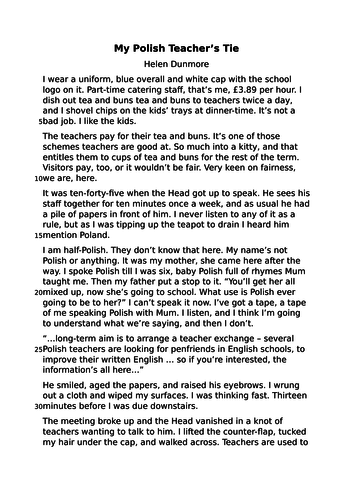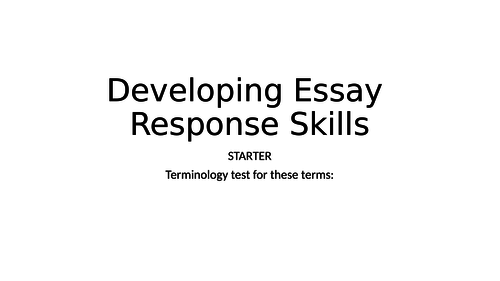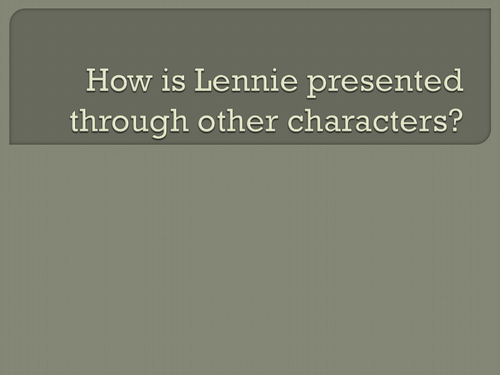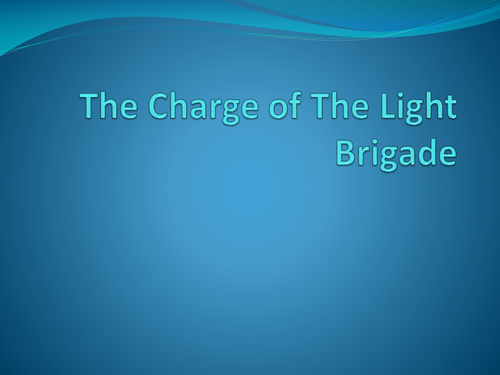
228Uploads
563k+Views
1397k+Downloads
English

Debate Boxing
This is quite possibly, the coolest thing I've ever tried out. The premise is as follows: a debate between two students (or teams) where four referees observe. The referees score what they see and a winner is announced at the end.
Now add in entrance music a la pro-wrestlers (think the Rocky Theme, We Will Rock You etc.) and run it on an open evening and I promise you this - you will have EVERY parent in at some point to see what is going on.
I've run this at SIX parents evenings now and the same thing happens every time - all of the kids rock up to watch. I set it last time round where the Deputy Head took on the winner of the students (a year 9 girl). They packed the place out to see who won . The debate topic "Batman vs Superman" (serious stuff this). Needless to say, she wiped the floor with him (in a totally professional way).
You'll need to be the promoter/commentator/ring side referee - this can be exhilarating and exhausting!
Try it.

AQA English Language Paper 2 Revision Pack (London 2012 vs The Great Exhibition)
Two powerpoints (both alike in dignity…); the larger of the two covers the deconstruction of an English Language Paper 2 Section A mock exam - we go through common mistakes, areas of concern and identify how to improve on what we’ve done. I’ve provided the sources too, so you could use this as the basis of a Section A walking-talking mock; the smaller powerpoint covers speech writing, an area my lot particularly struggled with.
Happy hunting…

AQA English Language Paper 1 Section A Mock Exam - My Polish Teacher's Tie
I've found another use for all that knowledge we have about the old AQA English Lit anthology (The Sunlight on The Grass anthology). I have started to turn them into English Language Paper 1 Section A Mock Exams!
This is one of them. There is no mark scheme, but if you use the Paper 1 mark scheme from the AQA website you should be fine.
This one uses the opening of My Polish Teacher's Tie.
Bundle

Year 7 English Curriculum
A series of resources that make up a curriculum that can be taught to year 7.

Punctuation vs Teachers: Tracking punctuation skill progress and making it fun(ish...)
A series of activities that are designed to be taught over time. There is a bit of initial leg-work to do in setting up the spreadsheet and, truth be told, I’ve had more success using this with smaller classes than with larger ones - the volume of specific data generated gets unwieldy with the larger groups.
So, I’ve divided punctuation up into three groups - BASIC, MID-RANGE and ADVANCED. The idea is that you teach/go over/re-demonstrate the type a type of punctuation. Then, the students are given ten minutes to write where they focus on using that type of punctuation. Each punctuation type has a points value, and the goal is to “defeat” a possessed teacher by using that type of punctuation. The powerpoint presentations each show a teacher (or a combination of teachers) making their way across the screen over the course of ten minutes. There’s the option of spooky orchestral music too.
There are specific work sheets that each student will need - each work sheet contains the points value of each punctuation type and a grid where you can wither self/peer/teacher assess depending on how you want to set the lesson up.
As the class progresses, so to does the complexity of the task. Each new level incorporates a new type of punctuation OR (more importantly) a new combination of focuses. For example, level 3 requires students to use BASIC and MID-RANGE punctuation to defeat two teachers.
What I found useful was the specific nature of the feedback I got: I could see quite clearly which punctuation types were defeating each student and which punctuation type was an issue for the class as a whole. And, if the class lost (which they did on more than one occasion) then they retried the level the following week.
We used this in SPAG lessons in combination with some other elements - it can easily be made into a whole lesson.
A useful little tool…

AQA English Language and Literature: Developing essay response skills to the Paris Anthology section
This is my attempt to engage and develop my Year 12s academic voices in their Paris Anthology related essay responses. The main issue my class had seemed to focus upon when and where to start. What I do is show them how they can place a particular emphasis on one of several potential areas of focus initially. I show them how they could use Mode, Audience, Purpose, each of Grice’s Maxims and each of the different levels of language as a starting point for an analytical response. The attached word document appears to be an “essay”.It isn’t. It’s the collected starting points placed in one document so that the students can focus more on the “how you do it” instead of trying to copy down the best bits.
It worked reasonably well and is suited for a class with similar needs. Hope you find this useful.
Bundle

AQA GCSE Curriculum
Every scheme of work that I’ve made that could be used to teach AQA English Language and AQA English Literature

AQA English Language Paper 2 Section A Revision Lesson
A single power point designed to be taught as a walking-talking mock examination. This can extend over several lessons - I predict you'll need at least three to do this justice. The source materials are included.
Bundle

The complete AQA pack
All of my resources for AQA's English Language and English Literature exams covered. In one nice neat pack.
Bundle

AQA English Literature Paper 1 Bundle: Shakespeare and 19th Century Text
Two schemes of work to help with the revision and initial teaching of Jekyll & Hyde and Romeo & Juliet. Plus, a spreadsheet to help with the tracking of it all.

AQA English Literature: Unseen Poetry pack
So, this unseen poetry section is quite scary isn't it? This was my way of attacking it with my KS4 students. I used song lyrics to start with, but also looked at some trickier poetic forms . The songs and poems you'll need to independently download are embedded in the lessons .
Bundle

AQA English Language Resource Bundle
A collection of resources that will aid you in the teaching of the AQA English Language specification. This is weighted more towards Paper 2 than Paper 1 at the moment - something I will rectify as soon as possible.
Bundle

Speaking and Listening Bundle
A few resources I've cobbled together to help teach speaking and listening across the year groups.

KS3: Introduction to Pre-1914 texts
A useful little unit that we put together to fill a 2/3 week gap. It has the students explore pre-1914 material - poetry and prose - and ends with a controlled assessment in the vein of the old AQA English style questions for the Literature paper.
Might fill some other gaps out there in shorter half terms.

KS4 Creative Writing Pack - inspired by "Your Shoes"
I wrote these lessons a while ago, but I remember getting some positive responses to the story AND the creative writing tasks.
For this, you will need some of those old AQA anthologies (the one that came BEFORE Sunlight on the Grass) - one of the short stories was called "My Shoes". The content, for those who don't remember, is rather more orientated towards KS4 than KS3, but the creative writing that comes from this resonates with the kids I taught at the time.
Hopefully you'll find this useful.

Animal Farm KS3 resource pack
I've taught this to top set year 8 and year 9 - had more success with the year 9s to be honest, but I think this would work with year 8s further in to the year. This was a series of lessons taught over the enormous 8 week half term. Hope the resources are useful to you!

KS4 GCSE Prose Of Mice and Men Pack
Contained within this pack is all the resources i used in my GTP year with a bottom set Year 10 GCSE group. I had mixed success bu i felt my teaching got stronger as i went through this unit. A starting point for those wondering where to start perhaps, or another way of looking at a topic thoroughly done.

KS4: Shakespeare and Conflict Poems: CONFLICT
Focused on the Shakespearean text vs the Conflict Poetry from the literary heritage. Very structured against the bands and pointed towards the controlled assessment.




















